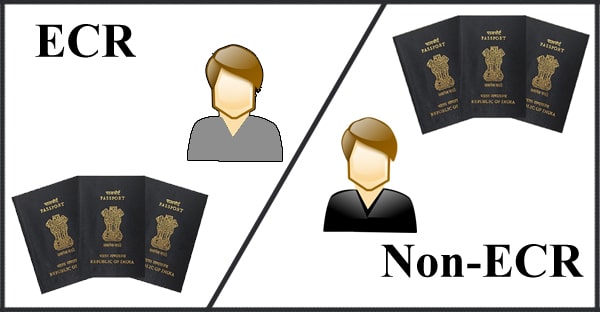People who are applying for the Passport or in the past applied for it must have encountered a question “Are you eligible for Non-ECR Category?”. ECR stands for Emigration Check Required and Non-ECR stands for No Emigration Check Required. Many of us are not aware of the meaning of the term ECR or Non-ECR. A Passport is a travel document which is used to travel to another country temporally for work, travel, study, etc. Non-ECR Stamp ensures you that you are eligible and capable of visiting another country for livelihood, studies, etc. In this article, we will provide you all the details regarding the ECR and Non-ECR Stamps in the Indian Passport.
Table of Contents
Who is Eligible for Non-ECR?
The following persons are eligible for Non-ECR Stamps in their passport, they will not required with the Emigration check when traveling to other country-

- All holders of Diplomatic/Official Passports.
- All Gazetted Government servants.
- All income taxpayers
- All professional degree holders
- Spouses and dependent children up to the age of 24
- All persons having educational qualification of 10th standard (SSC, Matriculation) and above.
- Seamen who are in possession of CDC or Sea Cadets.
- Seamen who are in possession of CDC or Sea Cadets, Desk Cadets
- Persons holding permanent immigration visas, such as the visa of UK, USA (such as a green card) and Australia.
- Persons possessing two years’ diploma from any institute recognized by the National Council for Vocational Training (NCVT) or State Council of Vocational Training (SCVT) or persons holding three years’ diploma/equivalent degree from institutions like Polytechnics, as recognized by Central/State Governments.
- Nurses possessing qualifications recognized under the Indian Nursing Council Act., 1947.
- All persons above the age of 50 years.
- All persons who have been staying abroad for more than three years (the period of three years could be either in one stretch or broken) and their spouses.
- All children below 18 years of age, provided they are accompanied by any or both of their parents.
Document List for Non-ECR category
The following are the Non-ECR category documents that are necessary for Non-ECR Application-
- Diplomatic Passport Holder
- Matriculation or Higher Educational Pass Certificate
- Person Above the Age of 50 Birth Certificate issued by the Municipal Authority
- School Leaving Certificate/ Secondary School Leaving Certificate
- Proof of assessment of income tax and actual payment of income tax for last one year
- Income Tax return statement and if applying for Spouse: Marriage Certificate
- Certificate of the professional degree held
- Nursing Certificate
- Person Staying abroad for more than three years requires to have a Passport copy, and in case of spouse marriage Certificate
- Persons holding Permanent Immigration requires to have a copy of Immigration Visas or the Permanent Resident card of the country of stay
What if You are Not Eligible for Non-ECR?
If you are not eligible for Non-ECR then you are required to get an Emigration Clearance Certificate from the Protector-General of Emigrants, Ministry of Overseas India Affairs. ECR Category stamp is a temporary stamp and is only valid for one journey. You can only visit the ECR Country after getting permission from the
The lists of ECR Countries are as follows-
- Afghanistan
- Bahrain
- Brunei
- Kuwait
- Indonesia
- Iraq (emigration banned)
- Jordan
- Lebanon
- Libya
- Malaysia
- Oman
- Qatar
- Sudan
- Syria
- The Kingdom of Saudi Arabia (KSA)
- Thailand
- United Arab Emirates (UAE)
- Yemen
How to Apply for Emigration Clearance Certificate?
The Emigration Clearance Certificate will be provided by the Protector-General of Emigrants, Ministry of Overseas India Affairs. You can use the Online Method to apply for the certificate. It is a two-way process meaning the employer as well as the employee (you) needs to register with the Online website. At a time the Employer can add up to 10 Profiles. After the Employer registers himself on the online portal then only you can apply for the Emigration Clearance Certificate.
I’m Shiv Kumar, a graduate with a passion for finance, marketing, and technology. My journey into finance started with a desire to understand money management and investing.
Our main goal is to empower individuals through financial education. We believe that everyone should have the opportunity to build a strong financial foundation. Whether you’re a seasoned investor or just getting started, we provide articles, guides, and resources to help you navigate the financial landscape.
I invite you to join our community of financially savvy individuals. Feel free to ask questions, engage with our content, and explore the topics that matter to you. Together, let’s take control of our financial futures.




